|
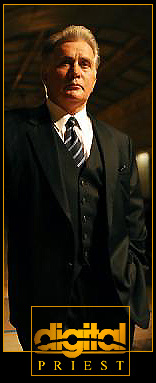
|
Of course, that's never gonna happen.
Why? It’s been done to death. But it’s the kind of ending that
always works and is utterly satisfying: a glimpse into happy
endings for our heroes.
I’d heard so much about this show while I was writing Black
Panther for Marvel. Many readers compared Panther to the West
Wing, a show I had never seen. I tried catching it a few times,
but it was on Wednesday, a night I almost never watch TV. But I
did decide to take a flyer on WW when the DVD box set came out.
 It took me a few episodes—I really wasn’t impressed by the
pilot. It seemed very Sports Night—a smart workplace dramedy—and
the show was clearly Rob Lowe and Moira Kelly’s vehicle. My
interest in it didn’t really pick up until Lowe and Kelly became
regularly upstaged by the brilliant Richard Schiff (Toby) who,
seriously, owns every scene he’s in, and the simply dazzling
Allison Janney (CJ), who took stacks of script pages and
turned them into riveting, hairpin turns of oratory while being
chased through the West Wing halls by a steadicam. It took me a few episodes—I really wasn’t impressed by the
pilot. It seemed very Sports Night—a smart workplace dramedy—and
the show was clearly Rob Lowe and Moira Kelly’s vehicle. My
interest in it didn’t really pick up until Lowe and Kelly became
regularly upstaged by the brilliant Richard Schiff (Toby) who,
seriously, owns every scene he’s in, and the simply dazzling
Allison Janney (CJ), who took stacks of script pages and
turned them into riveting, hairpin turns of oratory while being
chased through the West Wing halls by a steadicam.
I’d wait, impatiently, through the Mandy (Kelly) scenes waiting
for just a glimpse of CJ or Toby. And, a good an actor as Lowe
was, he really wasn’t selling it the way these other folks were.
Perhaps creator/writer Aaron Sorkin just never got the pulse of
Sam Seaborn, but I also think a relationship develops between an
actor and his/her role which, in turn, informs the writers. I
think Schiff’s performance inspired the writers to write more
towards the types of things Schiff was getting at, which in turn
inspired Schiff to flesh Toby out that much more. It’s possible
Lowe never had much of a breakthrough with Sam, and thus Sam
didn’t really evolve much from the pilot until his exit in
Season Four (Sam runs for Congress, loses, and, inexplicably,
never returns to the West Wing and is never mentioned again).
It’s possible Lowe never fully engaged with the WW because the
show was supposed to be his vehicle. Instead, he was
overshadowed, immediately, by Schiff and Janney and the
wonderful Bradley Whitford (Josh), and the emergence of film star
Martin Sheen as a major character more or less sealed the deal.
The show became an ensemble, with Sheen as anchor, whereas it
seemed designed to be a workplace dramedy about Seaborn and his
pals, with Sheen making only the odd guest appearance as the
president. I’m, assuming that, at the time, nobody actually
thought Sheen would be available on a weekly basis, but Sheen
surprised everyone by agreeing to do TV (which has now become a
trend; film stars returning to television). It’s possible
Sheen’s elevation to regular star, pushing Lowe (whose credit
always came first in the title sequence) into the ensemble,
disenchanted Lowe, as Sam’s contributions to the overall drama
grew thinner over the ensuing seasons.
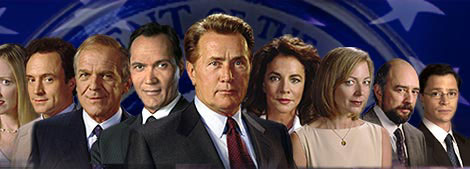
Joshua Malina, who arrived as Lowe’s replacement in Season Four,
brought much-needed energy as Toby’s sparring partner. While I
found Malina generally annoying on Sports Night, his whiny
annoying qualities worked rather well on WW insomuch as they
provided a springboard for lovely rants by Schiff (it’s also
notable that Malina’s Will Bailey is exponentially less annoying
than Kristin Chenoweth’s altogether useless Season Six addition
Annabeth Schott or the fingernails-on-chalkboard unpleasant
Jeannane Garoffalo—what an amazingly bad call these people
were). After Sorkin’s Season Four exit, the producers moved
Malina into Vice President “Bingo Bob” Russell’s office,
creating even more tension between Malina’s Will Bailey and
Schiff’s Toby, who likely fully expected Will to evolve into the
little brother role vacated by Lowe’s Sam Seaborn. Toby received
Bailey’s defection as an abject betrayal of the president, as
Veep Russell was certainly not the kind of man who should become
president, but Bailey was certainly good enough to make it
happen, getting the goofball Veep elected.
Since I’d missed most of seasons 1-5 on broadcast, I arrived on
the West Wing somewhere in mid Season Six, where some horrible
thing had happened to the show. I was, of course, confused by
the plotlines, but it was only after watching some of the DVD’s
that I realized the broadcast edition of the WW was a vastly
different creature from the show I was becoming acquainted with.
Malina’s Bailey, in Season Six, is a pill. A tiresome,
humorless, ruthless pawn of Veep Russell—himself a humorless,
power-hungry stooge with a flat personality. Which was nothing
at all like Gary Cole’s disarmingly wily vice president, who
came aboard as a schmuck forced on Bartlet by the GOP, and who
used his dull simpleton's image to his advantage, raiding Bartlet’s staff and launching intrigues behind the president’s
back. This was a character with a great deal of promise who, by
Season Six, had been relegated to, basically, one note as he
vied with Democratic rivals for the presidential nomination.
Bingo Bob was many things in Season Five, but he was neither
unlikable nor unwatchable, which he surely was in Season Six.
Same with Malina’s Bailey, a perfectly delightful cast addition,
who, like most of the WW cast, became just another voice in the
mad dash across Season Six.
 The heartbeat of the show was, of course, Aaron Sorkin, who
wrote most of the Season 1-4 episodes himself before either
quitting or being fired at the end of Season Four. Sorkin's
legendary dialogue, keen wit, and picture-perfect pacing made
this show, like all of his previous shows, an utter marvel for
me, a writer, to watch. A show that didn’t insult my
intelligence, that taught me things, that made me think, that
made me grow as a writer and as a person. I can forgive all of
the Sorkin ass-kissing going on in the commentaries (it really
gets piled high on occasion), and I suppose I can forgive
Sorkin’s ego being out of whack. He’s really just
that good.
Despite the gloom and doom I heard about Season Five, I found
Season Five to be at least as good as Season Four—which I found
uneven and at times plodding. Schiff steals the show yet again
in Season Five’s “Slow News Day,” where he attempts to save
Social Security and ends up resigning. The late John Spencer,
the brilliant and beautiful man who played White House Chief of
Staff Leo McGarry, more or less owns “Slow News Day,” even
though he’s only in it for two key scenes. The episode, focused
almost totally on Toby, is actually about Leo. About why he’s so
important and about why the president needs to trust him. The heartbeat of the show was, of course, Aaron Sorkin, who
wrote most of the Season 1-4 episodes himself before either
quitting or being fired at the end of Season Four. Sorkin's
legendary dialogue, keen wit, and picture-perfect pacing made
this show, like all of his previous shows, an utter marvel for
me, a writer, to watch. A show that didn’t insult my
intelligence, that taught me things, that made me think, that
made me grow as a writer and as a person. I can forgive all of
the Sorkin ass-kissing going on in the commentaries (it really
gets piled high on occasion), and I suppose I can forgive
Sorkin’s ego being out of whack. He’s really just
that good.
Despite the gloom and doom I heard about Season Five, I found
Season Five to be at least as good as Season Four—which I found
uneven and at times plodding. Schiff steals the show yet again
in Season Five’s “Slow News Day,” where he attempts to save
Social Security and ends up resigning. The late John Spencer,
the brilliant and beautiful man who played White House Chief of
Staff Leo McGarry, more or less owns “Slow News Day,” even
though he’s only in it for two key scenes. The episode, focused
almost totally on Toby, is actually about Leo. About why he’s so
important and about why the president needs to trust him.
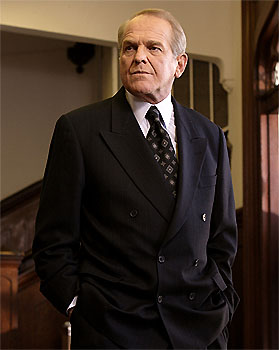 Spencer
was, indeed the soul of the show. Spencer
was, indeed the soul of the show.
The much maligned
Season Five should be subtitled Leo Full Throttle, as,
end-to-end it’s the McGarry Show, leading to the concluding
season episodes which clearly foreshadow the heart attack Leo
suffers in Season Six (sadly, the brilliant Spencer died of an
actual heart attack last week). Season Five is a tour de force
of Leo, Leo, Leo, commanding the troops, battling the president
when necessary, thundering through the halls, bitch slapping
Josh after Josh’s ego and arrogance costs the president his
agenda (Josh later brilliantly redeems himself by strategizing
the president through a government shutdown).
Season Five is marred by a certain flailing about in the early
episodes. I enjoyed John Goodman’s President Walken immensely
(“My only regret is we could only kill the bastard once,” a line
no president would ever say, Goodman being an almost perfect
fantasy president and better at it than Sheen), but the writers
didn’t seem to know where to go with the plot. They simply
bing!
found Zoey and that was that. Then they bumped off John Amos’
marvelous Admiral Fitzwallace for, I suppose, emotional punch
for their extremely lame season ender. Fitz was such a beloved
character, and his murder so ultimately useless and meaningless,
that it felt capricious. The character had already retired (from
the Navy and the show, as Amos had taken a role in a (gasps
audibly) WB pilot). If any character deserved a happy ending, it
was Amos. But, instead, they dragged him back to the WW set for
the sole purpose of being murdered by terrorists in order to add
cheap
“emotional punch” to the season finale. A finale that really
didn’t work because it took us too far away from the White House
walk-and-talk which, really, is what the show is about—people
walking through hallways.
Amanda Deavere-Smith’s wonderfully tough-gal Condoleeza Rice
clone Nancy McNally oddly vanished in Season Five after
delivering the wholly unpleasant Mary McCormack as the robotic
deputy National Security Advisor Commander Kate Harper. Harper,
who continues on the show at this writing, was, likely, intended
to be humorously humorless, but now she’s devolved into
Styrofoam. She is thoroughly unwatchable. Smith looked sick and
sounded odd during McNally’s final appearance, as if the actress
had been stricken with some ailment. Her appearance was so brief
as to suggest she was unable to continue on the show.
Season Four was, for me, the weakest season, with Season Two, I
think, being the series high point. Season Three, One and Five
are my likely favorites, with the non-Sorkin Season Five beating
out Sorkin’s final Season Four. I’m reading reviews online
praising Season Six as a return to greatness for the show. It’s
possible I need to see Season Six from the beginning to fully
appreciate it. What I’ve seen so far I’ve not liked. The show
has lost it’s charm and nearly all of its screwball humor. The
West Wing was always on the verge of becoming a comedy, Sorkin
taking us right up to that brink before launching into some
devastating drama. The Season Six episodes I saw had a few lame
attempts at humor, and those were tacked-on, few and far between, as the
tone of the show shifted towards a rushed re-structuring around
the presidential campaign.
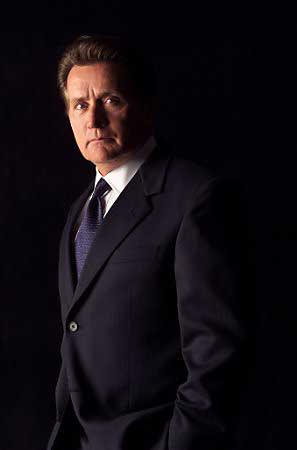
The most interesting thing, to me, about Martin Sheen’s Josiah
“Jed” Bartlet is that the producers allow him to be wrong. On
occasion, to be very wrong. Wanting to wipe out an entire city
in retribution for killing his friend (Season One’s
A
Proportional Response), ridiculing and pantsing Vice President
John Hoynes, played with delightful complexity—many parts hero,
many parts bastard—by the wonderful Tim Matheson. Hoynes was another
character who got the shaft for no real apparent reason and
ended up a clownish villainish spoiler, which seemed completely
out of character to the very noble (yet flawed) man Aaron Sorkin
created. In fact, this is probably what I’m trying to say, here:
the show and characters seemed to flatten quite a bit post-Sorkin,
as writers and producers either failed to understand the
complexity of a guy like Hoynes, a guy who really
could be
president (as opposed to Bartlet who was an unlikely winner but
who should be president; the difference between
could and
should being a certain strength of character), and instead
went for simpler notes on the scale (Hoynes bad, Santos good).
Jed Bartlet was both bad and good. I have absolutely no inside
track on this show at all, but it seems fairly telegraphed (to
me) that Toby’s Season Seven confession (and subsequent firing)
by Bartlet was a crock. That the real leak in the whole
draaaaaggged-pout space shuttle subplot was Bartlet himself, and
Toby threw himself on the tracks for the president. I’m sure of
it. I will be devastated to discover I’m wrong, because if I am,
that means the whole subplot was just ordinary—something the
West Wing has never been. Being ordinary is the greatest sin the
current creative staff could make.
From the pilot episode, where Bartlet defends Josh by rudely
throwing right-wing Christian lobbyists’ “fat assess out of my
house,” it was understood that Bartlet could be allowed to be a
complex Everyman struggling with his own faults, with his
resentment of and love for his father and the limitations of
power. He is the smartest guy in the room but, oddly, not always
the most noble. Dulé Hill’s inexplicably fresh Charlie
Young—also lost in oblivion during Seasons Six and Seven—wins my
vote for the most pure soul in the West Wing; Hill’s eyes
usually tell the story, and his character's odd speech pattern
and mixed bag of common sense and incredible intellect make most
every Charlie scene a real treat for my intellect and reason;
Charlie being the kid I used to be before working at Marvel for
27 years beat all optimism, hope, and nearly all intellect out
of me.
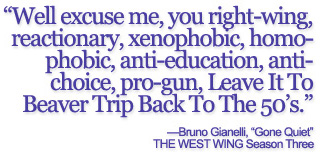 Which is not to say Sheen’s Bartlet is not noble—of course he
is. But it is often nobility delayed if not nobility denied or
at least nobility negotiated by the Republicans, the Klingons of
the series who are
regularly villainized and are cut only the occasional break
(most notably with Goodman’s temporary president, who comes
across like a bastard, but in the end was proved right and made
the exact right calls and acted in the best interest of the
nation, despite Josh’s paranoia about handing the Republicans
the White House). Which is not to say Sheen’s Bartlet is not noble—of course he
is. But it is often nobility delayed if not nobility denied or
at least nobility negotiated by the Republicans, the Klingons of
the series who are
regularly villainized and are cut only the occasional break
(most notably with Goodman’s temporary president, who comes
across like a bastard, but in the end was proved right and made
the exact right calls and acted in the best interest of the
nation, despite Josh’s paranoia about handing the Republicans
the White House).
This had to be a great role if not a defining one for Sheen as,
over the years, his Bartlet has been both hero and villain.
Stubborn and emotionally unavailable, arrogant, changing his
mind a dozen times about what Bible he wants to be sworn in on
(to the point where he has no Bible at all and is forced to be
sworn in on a Bible stolen from a red light district motel). A
blowhard and know it all, Sheen’s Bartlet could be
boring,
boring his own staffers who, giddy at the chance of a one-on-one
with the president almost immediately remember why they hate
having one-on-one’s with the president as, when in a chatty
mood, Bartlet would drown you in, say, the history of grapes. Staffers
like Josh or CJ would end up writhing in the guest chair and begging for
relief. In one episode Josh checks his watch and makes a
sideways crack about some dull topic Bartlet is droning on
about, for which Bartlet punishes Josh by refusing to go to bed
but launching into another full hour of something like the
evolution of the cumquat.
I was delighted by the very brave choice to make the president
the best educated man in the room while not always the smartest.
And, had he been the smartest guy in the room, even that would
not help him as the problems that land on his desk require
solutions that nearly always require some measure of sacrifice.
The question of the day was usually whom do we hurt in order to
achieve this greater good? For a compassionate father like
Bartlet, he needed to be surrounded by ruthless politicos like
Josh, and passionate voices like Toby, common sense types like
CJ, and someone who embodies an almost child-like hope for
better things like Sam. The additional battles between Percy
Fitzwallace (Chairman of the joint Chiefs) and Nancy McNally
(National Security Advisor) — two characters (and actors) who
were usually polarized by different perspectives, yet their
respect and immense affection for one another was subtext
clearly available to us (I often wondered if they weren’t having
a thing on the side)—added to the often confounding font of
wisdom this president was surrounded by and often drowning in.

Cutting through the clutter was the First Lady, hastily cast
just a day or so before shooting her first scene. Stockard
Channing has always been one of those actresses I delighted in
most any time I saw her. Here, on West Wing, she got herself
a piece of the rock. Afraid the character would be this empty
(Armani) dress, Channing dragged her feet about joining the cast
until Sorkin (or somebody) guaranteed her the First Lady’s roles
would be meaningful, even though she really is only a recurring
character (this year Channing has wandered off into a god-awful
sitcom with Henry Winkler. As a career move, I understand her
needing to put Abby Bartlet behind her, but, altogether now,
ewwww).
Channing launched herself into the meaty role of the president’s
most senior advisor, and, I have to imagine, her performance in
turn inspired the writers to increasing levels of possibility
with the character (whose screen time inevitably ate further
still into Robe Lowe’s, even though his name remained first in
the credits). Channing’s Abby was the only character who could
call the president “dumbass” and slam a door on him, the most
powerful man in the world made a mere mortal behind the closed
residence doors (or, most remarkably, their knock-down-drag-out
in the Oval Office in Season One’s The White House Pro-Am, an
utterly delightful explosion between the two that was so
convincing you’d actually believe Sheen and Channing—whom Sheen
had never met until five minutes before shooting their first
scene together—had been married for years.
The joke around the set, of course, was that Bartlet’s other
wife, his mistress, was Leo. John Spencer’s McGarry was
unquestionably the most powerful man in the West Wing. As
powerful if not more powerful than the president himself, Leo
was the conscience of the king, the voice Bartlet trusted above
all, perhaps even more than Abby, whose passion could often
cloud her judgment (Pro-Am, Season Four’s
Red Haven’s On
Fire). Bartlet kisses Leo on the forehead as Bartlet is prepped
for surgery, and the love these two men, these two brothers,
have for one another is supremely palatable. Leo would hurl
himself in front of a bus to protect Bartlet, and Bartlet would
tear up the U.S. Constitution to project Leo. Leo knows this and
so his friendship becomes all the more self sacrificing because
he has to keep Bartlet focused while still being his closest
friend while keeping the friendship from becoming the issue of
the day (Season Three’s brilliant Bartlet For America).
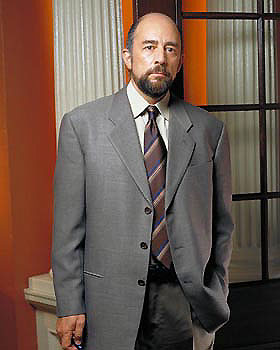 Spencer was absolutely the finest actor in the ensemble. The
only sane man in a West Wing full of nuts. An actor of
incredible range and power, Spencer just chewed his way through
every scene, adopting a quaint, fatherly sideways wobble as he
trundled the labyrinthine West Wing hallways. His face a mask of
authority and purpose, Leo had the ability to NOT get fixated on
what he called, “the knucklehead stuff,” while the president
would often fly off the rails, focusing on minutiae (U.N.
diplomats’ illegal parking in Season Four’s
Swiss Diplomacy,
hanging up on Leo and over-staying his welcome in Season Five’s
brilliant Disaster Relief). Spencer was absolutely the finest actor in the ensemble. The
only sane man in a West Wing full of nuts. An actor of
incredible range and power, Spencer just chewed his way through
every scene, adopting a quaint, fatherly sideways wobble as he
trundled the labyrinthine West Wing hallways. His face a mask of
authority and purpose, Leo had the ability to NOT get fixated on
what he called, “the knucklehead stuff,” while the president
would often fly off the rails, focusing on minutiae (U.N.
diplomats’ illegal parking in Season Four’s
Swiss Diplomacy,
hanging up on Leo and over-staying his welcome in Season Five’s
brilliant Disaster Relief).
I can’t speak for Spencer, but it seemed, to me, that he reveled
in this role, enjoying it thoroughly. I have not seen all of
Season Six, but I am told Leo suffers a heart attack and is
replaced by Allison Janney’s fabulous and popular CJ Cregg—whom
the writers immediately forget how to write for. The quirky
humor, the screwball wit, all gone. Even CJ’s sexiness—she was
attractive in an unexpected way—were lost as CJ was apparently
thrown into the deep end of the pool. By Season Seven (the
current season), nearly all humor and warmth are officially
missing. The writers seem now in such a rush to complete things
before the show’s inevitable 2006 cancellation, all storylines
seem a means to an end, whereas the West Wing was usually about
the journey itself.
Even Sheen’s magnificent creation, Josiah Bartlet, as been lost
somewhere along the way, which is why I’m praying and lighting
candles that I’m right—that Toby’s firing was part of a ploy
orchestrated by Bartlet himself (and that Toby, of course, is in
on it). These two men have had a very special relationship,
Toby being the very last man Bartlet wants to see wander into
his office because Toby is the conscience of the West Wing, the
conscience of the president. His very appearance is painful to
Bartlet, most especially when they’re alone and Toby will,
reluctantly but out of sense of duty, hurl himself into the
whirling knives (asking the president about Bartlet’s father’s
physical abuse in The Two Bartlets, and literally screaming at
Bartlet for hiding his MS from the public in the riveting
17
People).
It is precisely this relationship, this intimacy, this loathing
and love between these two men that lead me to believe only one
of two things are possible: (1) that the current West Wing
creative team is completely lost and have absolutely no clue
what they’re doing, or, hopefully (2) Bartlet himself was the
security leak, and Toby grabbed the third rail when he realized
it was his boss and news of that getting out would have gotten
Bartlet impeached.
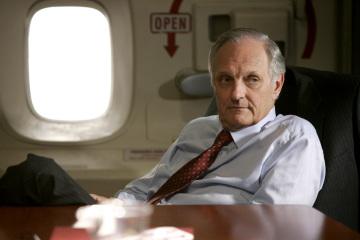
With the ratings in major decline, NBC did what most networks
do—they moved the show to the Sunday night graveyard just as
millions of new fans, like myself, were discovering this show
via DVD. It was an incredibly stupid move, one capriciously
designed to hasten the show’s death, but a move common to
network execs who, frankly, have never been the brightest people
on the planet. I’m not entirely sure I disagree with their
choice. The West Wing threatens to devolve into a lame
self-parody. With a very few exceptions, the writing is simply
atrocious, the characters are all treading water, and the magic
of the show (I believe the show was typically written as a
comedy and then pulled ever so slightly back from the brink) is
all but completely lost. All of the actors look stressed, whether
their parts call for it or not.
The producers have invested some real cash in Jimmy Smits who
just can’t find Matthew Santos and whose pulpit oratory is
severely lacking. Given Santos’ wealth of screen time, it seems
obvious they were grooming him for Sheen’s replacement, but
Smits is simply outgunned by the marvelous Alan Alda, the one
beacon of hope on the show these days (though notably missing
from the Season Seven cast image), who takes Smits
clean out
as an actor with an easy smile and a single line (most notable:
Alda’s 18-second appearance at the end of the Season Six finale
where he turns and says, “Okay. Now let’s go win this thing.”
You really won’t understand the power of Alda as an actor, as an
iconic figure, until you see him demolish a tour de force hour
of dizzy hand-held camera angles and super-fast deal making with
a single line of dialogue).
The only hope I have for a Season Eight is an Alda presidential
win. Smits is just not interesting enough and, like Lowe, not
giving the writers enough character to chew on. Moreover, the
actor who portrays Santos’ wife couldn’t possibly be less
interesting. The very idea of six years of Smits stumbling
around trying to find his character, with what appears to be a
terribly miscast cipher on his arm, is not inspiring at all. A
brilliant actor, Smits was once so invested in
L.A. Law’s
Victor Siffuentes, nobody thought he could make a convincing New
York cop. But, five years into NYPD Blue, Siffuentes was all
but forgotten as Smits had become Bobby Simone, who now haunts
his West Wing performance. Smits’ stellar performance as the
dying NYC detective now dogs his efforts to reinvent himself
here, as Matt Santos indeed comes across like a shell or a
shade, a dead man walking.
It is entirely possible, if not likely, that any dire
predictions I make here are short-sighted and wrong. Being found
wrong is one of the few joys left to me in life, when people
smarter and more clever than I can surprise and delight me with
the unexpected. But with the tragic loss of Spencer, with Sheen
apparently eager to move on before his Bartlet is rendered
completely impotent, with the sagging ratings and with no
apparent creative bright spots on the horizon, I am quite sure
we are seeing the last season of this landmark show, a show
which was, ultimately, a personal statement of its creator, and
one which did not fare well without him.
This was a fairly amazing show and rare for television: a show
that not only delighted us but informed and educated us, all the
while plumbing the untapped depths of literature and literacy. A
show that didn’t insult our intelligence but rather challenged
it. Having my writing compared to this was, indeed, a great
compliment, but I’m nowhere near this level. But this is the
league I wanna play in.
Christopher J. Priest
27 December 2005
DISCUSS THIS ESSAY
TOP
OF PAGE
THE WEST WING
images and sound clips Copyright © 2005 Warner Bos Entertainment Inc., A Time Warner Company. All Rights Reserved.
Text Copyright © 2007 Grace Phonogram eMedia. All Rights Reserved.
|